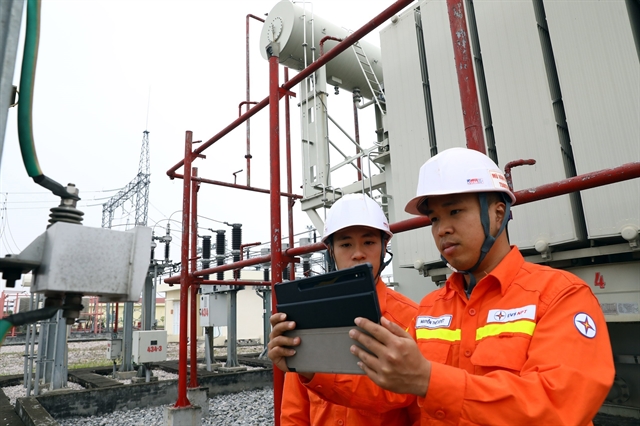The average electricity retail price was raised from VND1,864.44 per kWh to VND1,920.37 (excluding value-added tax), starting from Monday, which provided the basis to increase the retail prices of electricity for daily life and production.

Average electricity retail prices were hiked by three per cent from Monday after four years of being kept unchanged, Viet Nam Electricity (EVN) announced yesterday.
The average electricity retail price was raised from VND1,864.44 per kWh to VND1,920.37 (excluding value-added tax), starting from Monday, which provided the basis to increase the retail prices of electricity for daily life and production.
The hike was made because EVN reported a record loss of VND36.3 trillion (US$1.55 billion) from electricity production in 2022, highlighting the urgent need to raise electricity retail prices to save financially struggling EVN and ensure energy security.
In the document sent to EVN on April 27, the Ministry of Industry and Trade urged EVN to adjust electricity retail price in 2023 at the allowed maximum level of 3 per cent with an appropriate roadmap to prevent shocks to daily life, production and business and ensure harmonisation of benefits between producers and users.
Previously, the Ministry of Industry and Trade announced the inspection result and EVN’s electricity production and business costs in 2021 and 2022, which found that electricity production and business costs in 2022 were VND2.032,26 per kWh, an increase of 9.27 per cent against 2021.
The increase mainly came from the electricity generation stage, which jumped by nearly 21.5 per cent.
EVN estimated that if the electricity prices were not increased this year, it would suffer a loss of about VND64 trillion due to increases in exchange rates, input fuel prices for thermal and gas-fired power, and high prices of renewable electricity.
The Ministry of Industry and Trade said that hiking electricity prices was inevitable as prices of input materials for electricity production increased. Mixed coal increased by 34.7-46.4 per cent in 2022 over 2021, gas by 27.4 per cent and VND/USD exchange rate by 2.2 per cent.
Under the current regulations, EVN has the authority to decide increases of less than 5 per cent, while increases by 5-10 per cent are under the authority of the Ministry of Industry and Trade and 10 per cent or more under the authority of the Government.
According to economic expert Nguyen Bich Lam, the most recent electricity price hike was in March 2019, with an increase of 8.36 per cent. Electricity prices were kept unchanged for four consecutive years while the energy crisis was taking place on a global scale, making it inevitable to adjust electricity retail prices.
The hike would encourage electricity saving, Lam said, adding that it would force production and business establishments to restructure their expenses to lower production costs and use energy more rationally and economically.
Higher electricity prices would also contribute to promoting energy transition in enterprises by investing in installing solar power systems. Electricity generated from fossil fuels accounted for a large proportion, he said, citing that coal-fired, gas–fired and oil–fired electricity accounted for 43.5 per cent of the total electricity output.
He said that the hike would help EVN to overcome financial difficulty and invest in increasing output to meet the electricity demand of the economy.
As electricity is a special type of energy, a strategic commodity with prices under control by the Government and an important input in most economic sectors and for household consumption, electricity price increases would have a huge impact, including dragging down growth and pushing up inflation.
He estimated that an 8 per cent increase in electricity price would cause GDP to decrease by 0.36 per cent and inflation to go up by 0.5 per cent, while a 10 per cent increase would cause GDP to decrease by 0.45 per cent and inflation to go up by 0.61 per cent.
As Viet Nam set the growth target at 6.5 per cent and inflation below 4.5 per cent this year, electricity prices could increase by at most 8 per cent this year, Lam said.
A bold move toward energy transition
As well as encouraging energy savings, electricity price increase would also give a push to the energy transition.
Lam said that energy transition was an inevitable and irreversible trend of the world economy to ensure green and sustainable growth, but the process required a huge investment.
It became pressing to develop a strategy and roadmap for the energy transition away from fossil–fueled energy to renewable and green energies to enhance the independence and competitiveness of the economy, especially in the context of the global energy crisis, which caused negative impacts and economic disruption.
At COP26, Viet Nam strongly committed to achieving net zero emissions by 2050. Energy transition played a critical role in achieving this goal.
Lam said that the Government should urgently develop a strategy and roadmap for energy transition and raise policies to encourage enterprises to invest in renewable energy.
To respond to the energy crisis and avoid the impact of unpredictable global geopolitics development, enterprises should focus on investing in switching to renewable energy, improving brand image and increasing competitiveness advantage, Lam urged.
He said switching to renewable energy would help enterprises stay ahead of competitors and create differences in their brands. — VNS





